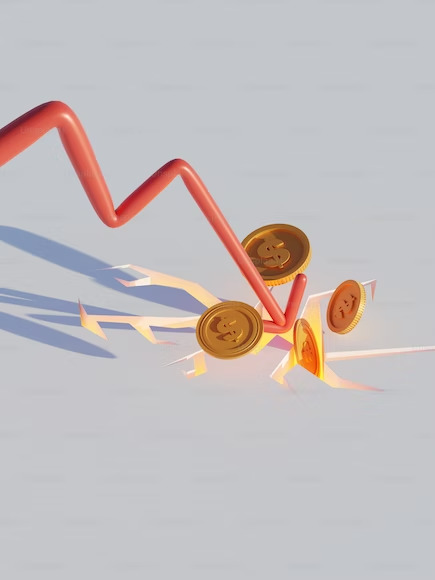Likelihood of economic recession to rise as widespread challenges continue

Photo by Shubham Dhage
A visualization of economic decline. Although the economy has not yet reached a point that warrants much necessary concern, struggles pertaining to inflation and the possibility of recession continue. Photo by Shubham Dhage, and liscensed under the Unsplash+ Liscense.
Since the COVID-19 pandemic in 2020, the American economy has been facing instability derived mainly from a rise in inflation and hikes in interest rates. These widespread challenges, combined with more recent economic upsets, have conspired to increase the likelihood of an economic recession.
“A recession is where you see people not spending…not buying big, high priced items, and resulting in firms, businesses, not being able to not produce those things,.” economics teacher Brian Kabourek said. “If they don’t need workers, they lay them off…What it is, in a nutshell, is a slowdown in the economy.”
The majority of America’s current economic uncertainty stems from a flood of money into the economy during the COVID-19 pandemic. To prevent widespread business failures, the federal government printed and distributed mass amounts of money, resulting in many people having excess funds.
“Long-lasting episodes of high inflation are often the result of lax monetary policy.” The article “Inflation: Prices On The Rise” by Ceyda Oner wrote,. “If the money supply grows too big relative to the size of an economy, the unit value of the currency diminishes.”
The sudden increase in available cash led to a spike in spending, causing prices to rise and the value of money to drop. Inflation rose rapidly, reaching a total annual rate of over 7% as of 2023 – more than three times the average rate for the entire decade before COVID. Initially, the federal government assumed it was transitory, but over a year later – with inflation having only increased – the government finally acted, rapidly increasing interest rates and making the borrowing of money more expensive to disincentive spending and help curb inflation.
However, as interest rates drastically increased, anything involving the borrowing of money has become much more expensive. Skyrocketing house prices and inflamed mortgages have caused havoc in the housing market, and economic growth is being suppressed in an attempt to steady the economy.
The result has been a Darwinian effect on businesses across the country: firms that aren’t financially sound or that make bad investments have a higher likelihood of collapsing in an uncertain economy; with one example being the Silicon Valley Bank failure – the collapse of a bank that catered mostly to startups – that occurred earlier this March.
“I think it’s something that we have to keep our eye on,.” Kabourek said. “Talking to people that are in the business, I don’t think it’s necessarily something we have to be concerned about, especially here in the Midwest.”
Although most recent business failures aren’t likely to significantly impact the economy, ongoing economic troubles stubbornly persist. People everywhere would be wise to focus on maintaining emergency financial funds, avoiding debt or loans, and remaining frugal with money. Avoiding irresponsible spending habits or uninformed investments can increase individual financial safety and security in an unsure economy.
“It’s really in the hands of the American people,.” Kabourek said. “Are we spending money on the things that we need or are we overspending on things that we don’t?”

Kylie Brown is a senior at East, and this is her third year on the Oracle staff. Her favorite thing about the Oracle is that everyone knows each other,...

